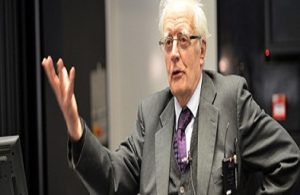Renowned British statistician Sir David Cox has been awarded with the inaugural recipient of the International Prize in Statistics.
About David Cox :
Cox was born in Birmingham. He was employed from 1944 to 1946 at the Royal Aircraft Establishment, from 1946 to 1950 at the Wool Industries Research Association in Leeds and from 1950 to 1956 worked at the Statistical Laboratory at the University of Cambridge. From 1956 to 1966 he was Reader and then Professor of Statistics at Birkbeck College, London.
- In 1966, he took up the Chair position in Statistics at Imperial College London where he later became head of the mathematics department. In 1988 he became Warden of Nuffield College and a member of the Department of Statistics at Oxford University. He formally retired from these positions in 1994.
- Cox has received numerous honorary doctorates, including from Heriot-Watt University in 1987. He has been awarded the Guy Medals in Silver (1961) and Gold (1973) of the Royal Statistical Society.
- He was elected Fellow of the Royal Society of London in 1973, was knighted by Queen Elizabeth II in 1985 and became an Honorary Fellow of the British Academy in 2000. He is a Foreign Associate of the US National Academy of Sciences and a foreign member of the Royal Danish Academy of Sciences and Letters.
- In 1990, he won the Kettering Prize and Gold Medal for Cancer Research for “the development of the Proportional Hazard Regression Model.” In 2010 he was awarded the Copley Medal of the Royal Society “for his seminal contributions to the theory and applications of statistics.” He is also the first ever recipient of the International Prize in Statistics.
- He has supervised, collaborated with, and encouraged many younger researchers now prominent in statistics. He has served as President of the Bernoulli Society, of the Royal Statistical Society, and of the International Statistical Institute. He is an Honorary Fellow of Nuffield College and St John’s College, Cambridge, and is a member of the Department of Statistics at the University of Oxford.
- He has made pioneering and important contributions to numerous areas of statistics and applied probability, of which the best known is perhaps the proportional hazards model, which is widely used in the analysis of survival data.
About the International Prize :
The International Prize in Statistics recognizes a major achievement of an individual or team in the field of statistics and promotes understanding of the growing importance and diverse ways statistics, data analysis, probability and the understanding of uncertainty advance society, science, technology and human welfare.
- With a monetary award of $75,000, it is given every other year by the International Prize in Statistics Foundation, which is comprised of representatives from the American Statistical Association, International Biometric Society, Institute of Mathematical Statistics, International Statistical Institute and Royal Statistical Society.
- Recipients are chosen from a selection committee comprised of world-renowned academicians and researchers and officially presented with the award at the World Statistics Congress.
About Cox Model :
Successful application of the Cox Model has led to life-changing breakthroughs with far-reaching societal effects, some of which include the following
- Demonstrating that a major reduction in smoking-related cardiac deaths could be seen within just one year of smoking cessation, not 10 or more years as previously thought
- Showing the mortality effects of particulate air pollution, a finding that has changed both industrial practices and air quality regulations worldwide
- Identifying risk factors of coronary artery disease and analyzing treatments for lung cancer, cystic fibrosis, obesity, sleep apnea and septic shock
International Statistics Day – October 20 2016
The theme for this year is “Better Data, Better Lives”. This theme emphasizes the critical role of high-quality official statistical information in analysis and informed policy decision-making in support of sustainable development.
- It also reflects the importance of sustainable national statistical capacity to produce reliable and timely statistics and indicators measuring a country’s progress.
- On this World Statistics Day UN Chief urged all partners and stakeholders to work together to ensure that the necessary investments are made, adequate technical capacity is built, new data sources are explored and innovative processes are applied to give all countries the comprehensive information systems they need to achieve sustainable development.
- UNCTAD works as a key partner within the United Nations Statistical System, with member States and international organisations to provide a targeted, professional statistical service that provides the best quality statistics on trade and the interrelated fields of foreign direct investment, information economy, creative economy and maritime transport.
- It is noted that Statistics is the study of the collection, analysis, interpretation, presentation, and organization of data.In applying statistics to, e.g., a scientific, industrial, or social problem, it is conventional to begin with a statistical population or a statistical model process to be studied.
- Populations can be diverse topics such as “all people living in a country” or “every atom composing a crystal”. Statistics deals with all aspects of data including the planning of data collection in terms of the design of surveys and experiments.

